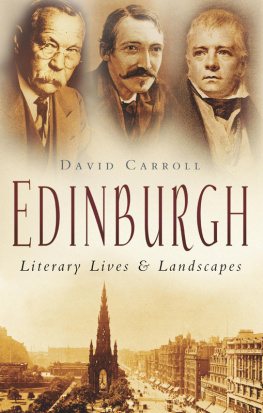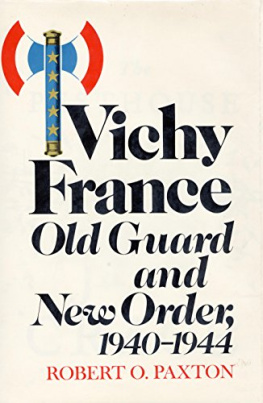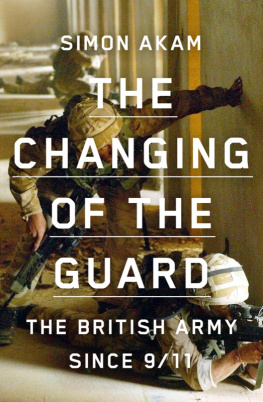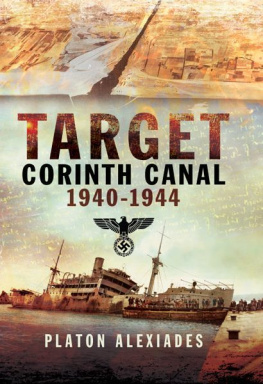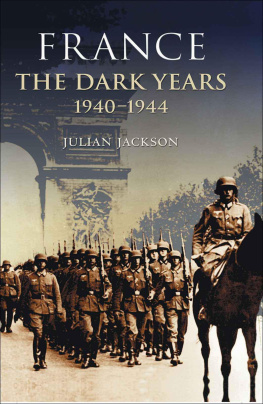David Carroll - Dads Army: The Home Guard 1940-1944
Here you can read online David Carroll - Dads Army: The Home Guard 1940-1944 full text of the book (entire story) in english for free. Download pdf and epub, get meaning, cover and reviews about this ebook. year: 2002, publisher: The History Press, genre: Non-fiction. Description of the work, (preface) as well as reviews are available. Best literature library LitArk.com created for fans of good reading and offers a wide selection of genres:
Romance novel
Science fiction
Adventure
Detective
Science
History
Home and family
Prose
Art
Politics
Computer
Non-fiction
Religion
Business
Children
Humor
Choose a favorite category and find really read worthwhile books. Enjoy immersion in the world of imagination, feel the emotions of the characters or learn something new for yourself, make an fascinating discovery.
- Book:Dads Army: The Home Guard 1940-1944
- Author:
- Publisher:The History Press
- Genre:
- Year:2002
- Rating:4 / 5
- Favourites:Add to favourites
- Your mark:
- 80
- 1
- 2
- 3
- 4
- 5
Dads Army: The Home Guard 1940-1944: summary, description and annotation
We offer to read an annotation, description, summary or preface (depends on what the author of the book "Dads Army: The Home Guard 1940-1944" wrote himself). If you haven't found the necessary information about the book — write in the comments, we will try to find it.
Dads Army: The Home Guard 1940-1944 — read online for free the complete book (whole text) full work
Below is the text of the book, divided by pages. System saving the place of the last page read, allows you to conveniently read the book "Dads Army: The Home Guard 1940-1944" online for free, without having to search again every time where you left off. Put a bookmark, and you can go to the page where you finished reading at any time.
Font size:
Interval:
Bookmark:
DADS ARMY
THE HOME GUARD 19401944
DAVID CARROLL

For Sam
First published in 2002
This edition first published in 2009
The History Press
The Mill, Brimscombe Port
Stroud, Gloucestershire, GL5 2QG
www.thehistorypress.co.uk
This ebook edition first published in 2013
All rights reserved
David Carroll, 2002, 2009, 2013
The right of David Carroll to be identified as the Author of this work has been asserted in accordance with the Copyright, Designs and Patents Act 1988.
This ebook is copyright material and must not be copied, reproduced, transferred, distributed, leased, licensed or publicly performed or used in any way except as specifically permitted in writing by the publishers, as allowed under the terms and conditions under which it was purchased or as strictly permitted by applicable copyright law. Any unauthorised distribution or use of this text may be a direct infringement of the authors and publishers rights, and those responsible may be liable in law accordingly.
EPUB ISBN 978 0 7524 9989 5
Original typesetting by The History Press
CONTENTS
ACKNOWLEDGEMENTS
I am grateful to everyone who shared their Home Guard memories with me, and whose personal recollections form such a vital part of this book.
Frank and Joan Shaw have been extremely generous in allowing me to draw without hindrance from their splendid volume We Remember the Home Guard. I am also indebted to the individual contributors to that book who have permitted me to quote from their respective accounts. Chris Blount of BBC Radio Cornwall has given me access to his 1991 oral documentary on the subject from which I have drawn on Rex Daveys memories and Eric Higgss account of the events surrounding 7 September 1940. Bill Grifin, of the Choughs Association at Newquay, supplied me with a great deal of information and literature relating to the Home Guard in his part of the world, including Captain W.A. Owens vivid eye-witness account of the London Stand Down parade (contained in the Choughs Annual Register of 1944). I am indebted to the many and mainly unknown authors of various Home Guard Battalion histories, a large number of which were printed and circulated privately. They all proved invaluable to me in my research. My chapter about Britains Secret Army would not have been possible without the help of David Lampes definitive account of the subject, The Last Ditch, from which source much of the background information was drawn. Equally vital was the personal memoir written by Frederick J. Simpson of Dorset, which describes in detail his experiences as a member of Auxiliary Units. I am most grateful to him for allowing me to quote from it at such length. Bombers & Mash:The Domestic Front 19391945 by Raynes Minns yielded valuable background information for my chapter about women in the Home Guard.
I should like to thank the following for the use of copyright material:
The Phoney War (Michael Joseph, London, 1961), E.S. Turner and reproduced by permission of Penguin Books Ltd.; The Last Ditch (1968), David Lampe and Cassell plc; From Dusk Till Dawn (1945), A.G. Street, Cassell plc and Blandford Press; Please You Draw Near (1969), Ernest Raymond and Cassell plc; The Collected Essays, Journalism and Letters of George Orwell, Volume Two: My Country Right or Left (1968), A.M. Heath & Co. Ltd. on behalf of Bill Hamilton as the Literary Executor of the Estate of the late Sonia Brownell Orwell and Martin Secker & Warburg Ltd.; The Home Guard of Britain by Charles Graves (Hutchinson 1943), reprinted by permission of the Random House Group Ltd.; The Real Dads Army by Norman Longmate (Hutchinson 1974), David Bolt Associates; four lines from Watching Post from the Complete Poems of C. Day Lewis (Sinclair-Stevenson 1992), the Estate of C. Day Lewis; Civilians at War: Journals 19381946 (1984), George Beardmore and John Murray (Publishers) Ltd.; Hare Joins the Home Guard (Wm. Collins 1941), the Trustees of the Alison Uttley Literary Property Trust; Memoirs of the Forties by Julian Maclaren-Ross (Sphere Books Ltd. edn., MacDonald & Co. 1991), the late Alan Ross; Further Particulars (1987), C.H. Rolph, Oxford University Press and David Higham Associates; extracts from messages and broadcasts by King George VI, the Registrar of the Royal Archives; various letters, documents and publications issued by the War Office, extracts from Sir Edward Griggs speech to the House of Commons and Sir Winston Churchills third anniversary message to the Home Guard, the Controller of Her Majestys Stationery Office. The originals of the documents from which many of the contemporary extracts in this book are taken are held in the Public Record Office. I have made every effort to contact all copyright holders. Any omissions are entirely unintentional, and I would be pleased to rectify them (upon notification) in any subsequent edition of this work.
Lastly, my greatest thanks go to Jonathan Falconer at Sutton Publishing for guiding me through this project, Bernadette Walsh for her support and Bill Pertwee for generously contributing a Foreword.
FOREWORD
Memories of the actual Local Defence Volunteers, later the Home Guard, came flooding back to me during the day of the first rehearsal of televisions Dads Army (and my role as Chief Air Raid Warden Hodges).
In June 1940, my mother and I were staying with my aunt and uncle at Belvedere in Kent. On the night of Anthony Edens broadcast asking for volunteers to help fight a possible German invasion force, my uncle went straight down to the local police station to enlist. Uncle Bill Tobin was a strapping great Irishman of 6 ft 3 in who had been through the First World War; in fact he was a boy bugler in the Boer War. In one encounter with the Germans during the First World War he had single-handedly silenced an enemy machine-gun crew by, believe it or not, strangling them! So you can see he was slightly eccentric and pretty courageous. Just the sort of man Anthony Eden hoped would answer his call. On the night in question Uncle Bill said to the police sergeant on duty at the station, Im Captain Tobin (his rank in the First World War) and Im taking command of the local volunteers. Apparently, so we heard afterwards, the police sergeant hadnt listened to Edens broadcast and thought that here was some lunatic playing games. He proceeded to try and calm my uncle. Rather like the great radio comedian of the day, Robb Wilton, he started shuffling some papers about on his desk and licking his pencil. My uncle told him hed be back when he had pulled himself together. He then went home and, using his obvious strength, started taking the large furniture table, chairs, sideboard, bookcases, etc. out of the house and laying it across the road like a barricade. My aunt, who was Brazilian like my mother, just laughed at anything her husband did, and filling up the road with her furniture was just another one of his eccentric acts. My uncles final remark on the matter seemed even more eccentric. Well, they wont get through tonight. You can imagine my astonishment when I first read Jimmy Perry and David Crofts script for the Columbia feature film of Dads Army that we did in the early 1970s. Here was Captain Mainwaring assembling a roadblock of household furniture at Walmington-on-Sea. When I told the writers about my uncles antics they too were astonished, as they had seriously thought of cutting out the furniture scene from the script because it seemed just too ridiculous. Fact certainly is stranger than fiction as they say.
This was only one of the incidents I remember from those strange days of 1940. Soon after the episode concerning my uncle, my mother and I moved into a bungalow on Dartford Heath, also in Kent. There, we were not only a mile or so from a huge gathering of anti-aircraft guns based on the heath but we were also directly under, or so it seemed, the majority of air battles being fought out in the summer skies between the fighters and bombers of the Luftwaffe and our own Spitfires and Hurricanes. During these battles there were several instances that concerned the Home Guard. I remember a Heinkel bomber coming over very low one afternoon as I was walking up the road from the bus-stop after my college studies. The plane seemed to be dropping all sorts of things on to the surrounding area to lighten its load on its way back to Germany. In fact, it was so low I could see the front gunner in his turret. I dived into a ditch soiling my blazer in the process. When I got home I told my mother what had happened. Oh, dont worry, she said. Mr Stewart next door is in the Home Guard. Hell sort it out. That remark typified what nearly everyone thought about the Home Guard. They were the guardians of the civilian population, and this feeling had developed very quickly. The Home Guard, of course, were among us all every day of the week because most of them worked in jobs and services that were a part of our everyday lives.
Next pageFont size:
Interval:
Bookmark:
Similar books «Dads Army: The Home Guard 1940-1944»
Look at similar books to Dads Army: The Home Guard 1940-1944. We have selected literature similar in name and meaning in the hope of providing readers with more options to find new, interesting, not yet read works.
Discussion, reviews of the book Dads Army: The Home Guard 1940-1944 and just readers' own opinions. Leave your comments, write what you think about the work, its meaning or the main characters. Specify what exactly you liked and what you didn't like, and why you think so.



